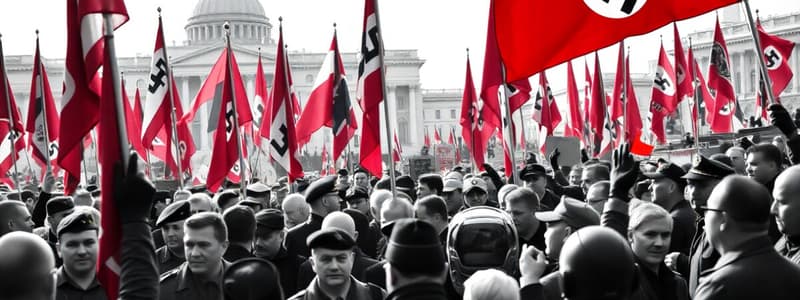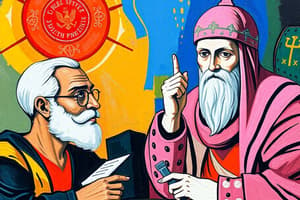Podcast
Questions and Answers
Which of the following is NOT a characteristic of political religion?
Which of the following is NOT a characteristic of political religion?
- Subordination of individuals to collective goals
- Intolerance of dissent
- Sacralization of political systems
- Emphasis on individual rights (correct)
The concept of 'political religion' gained prominence in the 20th century primarily through the analysis of totalitarian regimes.
The concept of 'political religion' gained prominence in the 20th century primarily through the analysis of totalitarian regimes.
True (A)
What is a key difference between 'political religion' and 'civil religion'?
What is a key difference between 'political religion' and 'civil religion'?
Political religion typically operates in totalitarian regimes with ideological dominance, while civil religion exists within democratic systems and promotes pluralism.
The ______ of Adolf Hitler in Nazi Germany is a prominent example of political religion.
The ______ of Adolf Hitler in Nazi Germany is a prominent example of political religion.
Match the following concepts with their definitions:
Match the following concepts with their definitions:
Which of the following is an example of the 'religion of politics'?
Which of the following is an example of the 'religion of politics'?
The 'Cult of Reason' during the French Revolution is an example of political religion.
The 'Cult of Reason' during the French Revolution is an example of political religion.
What is a potential downside of political religion?
What is a potential downside of political religion?
Which of the following is NOT a characteristic of civil religion as described by Robert Bellah?
Which of the following is NOT a characteristic of civil religion as described by Robert Bellah?
Political paratheology is characterized by a clear separation between religious and secular domains.
Political paratheology is characterized by a clear separation between religious and secular domains.
What is the primary difference between civil religion and political religion?
What is the primary difference between civil religion and political religion?
The concept of velayat-e faqih, which grants supreme authority to religious leaders, is central to the ______ government.
The concept of velayat-e faqih, which grants supreme authority to religious leaders, is central to the ______ government.
Match the following terms with their corresponding definitions:
Match the following terms with their corresponding definitions:
Provide an example of how the use of Christian theology in U.S. politics has influenced public discourse.
Provide an example of how the use of Christian theology in U.S. politics has influenced public discourse.
Theocracy is a common form of government in the 21st century.
Theocracy is a common form of government in the 21st century.
How can political paratheology impact foreign policy?
How can political paratheology impact foreign policy?
Which of the following best describes the connection between political religion and theocracy?
Which of the following best describes the connection between political religion and theocracy?
The concept of ______ highlights the potential for religious narratives to be institutionalized into governance structures.
The concept of ______ highlights the potential for religious narratives to be institutionalized into governance structures.
Flashcards
Political Religion
Political Religion
Sacralization of political systems or ideologies, often seen in totalitarian regimes.
Totalitarian Regimes
Totalitarian Regimes
Governments with absolute ideological dominance, intolerant of dissent.
Nazi Germany
Nazi Germany
An example of political religion with the deification of Hitler and Aryan ideology.
Soviet Union
Soviet Union
Signup and view all the flashcards
Religion of Politics
Religion of Politics
Signup and view all the flashcards
Cult of Reason
Cult of Reason
Signup and view all the flashcards
Civil Religion
Civil Religion
Signup and view all the flashcards
Political Paratheology
Political Paratheology
Signup and view all the flashcards
Theocracy
Theocracy
Signup and view all the flashcards
Examples of Civil Religion
Examples of Civil Religion
Signup and view all the flashcards
Collective Memory
Collective Memory
Signup and view all the flashcards
Moral Framework
Moral Framework
Signup and view all the flashcards
Religious Narrative in Governance
Religious Narrative in Governance
Signup and view all the flashcards
Religio-Political Power
Religio-Political Power
Signup and view all the flashcards
Influence on Foreign Policy
Influence on Foreign Policy
Signup and view all the flashcards
Study Notes
Political Religions and Ideologies
-
Political Religion: A system where political systems, ideologies, or leaders are treated as sacred, demanding absolute loyalty and intolerance of dissent. It subordinates individuals to collective political goals. Commonly associated with totalitarian regimes.
-
Political Religion - Context: The concept gained prominence studying 20th-century totalitarian regimes like Fascism, Nazism, and Communism. Researchers like Emilio Gentile highlight how political religions take over the roles of traditional religions in offering meaning, rituals, and symbols.
-
Political Religion - Examples: Nazi Germany (deification of Hitler and the Aryan race), Soviet Union (Marxism-Leninism as a quasi-religion with sacred texts, rituals, and infallible leaders).
-
Political Religion - Connections: Sacralized politics (extreme form of ideological domination); contrasts with civil religion (which operates within democracy and allows for pluralism).
-
Religion of Politics: Treating political ideologies or leaders with religious reverence. Often overlaps with political religion but can exist in less authoritarian contexts.
-
Religion of Politics - Context: Highlights how political movements use religious structures for support and collective identity.
-
Religion of Politics - Examples: French Revolution's "Cult of Reason", personality cults surrounding leaders like Stalin or Mao.
-
Religion of Politics - Connections: Political paratheology (mixing theological and political elements); may coexist with civil religion but lacks its democratic and pluralistic characteristics.
-
Civil Religion: Integrates religious principles into a nation's political life to foster unity and shared values, operating within democratic systems and respecting pluralism.
-
Civil Religion - Context: Robert Bellah's work on American civil religion shows its role in integrating religious symbolism (e.g., God in speeches) into national identity. Acts as a moral framework for understanding legislation and civic duty.
-
Civil Religion - Examples: U.S. use of “In God We Trust,” invocation of divine guidance in presidential speeches; Germany's civil religion including the collective memory of the Holocaust.
-
Civil Religion - Connections: Contrasted with political religion due to its democratic nature; shares an emphasis on universal values like liberty and justice.
-
Political Paratheology: Uses theological language/concepts to legitimize power or mobilize support in political discourse, blurring religious and secular governance distinctions.
-
Political Paratheology - Context: Relevant in societies with strong religious cultural identities, where leaders invoke divine will or moral imperatives to justify policies.
-
Political Paratheology - Examples: U.S. presidents using Christian theology, Islamic leaders using Sharia law for governance in countries like Iran.
-
Political Paratheology - Connections: Influence on foreign policy, often overlaps with sacralized politics when theological elements are used for legitimacy.
-
Theocracy: Religious institutions/leaders hold supreme authority, often claiming divine legitimacy.
-
Theocracy - Context: Usually combines religious and political power, though rare in modern times, historically significant and present in certain contemporary states.
-
Theocracy - Examples: Iran's Islamic Republic (clerics have ultimate authority), Vatican City.
-
Theocracy - Connections: Often functions as a political religion, combining governance with sacred authority; shows religious narratives transforming into governance structures.
Studying That Suits You
Use AI to generate personalized quizzes and flashcards to suit your learning preferences.




